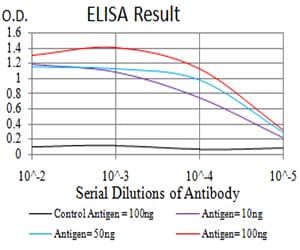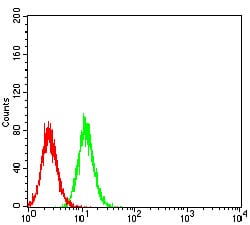

| WB | 咨询技术 | Human,Mouse,Rat |
| IF | 咨询技术 | Human,Mouse,Rat |
| IHC | 咨询技术 | Human,Mouse,Rat |
| ICC | 技术咨询 | Human,Mouse,Rat |
| FCM | 1/200 - 1/400 | Human,Mouse,Rat |
| Elisa | 1/10000 | Human,Mouse,Rat |
| Aliases | CDHN; NCAD; CD325; CDw325 |
| Entrez GeneID | 10000 |
| clone | 7B7A2 |
| WB Predicted band size | 55.8kDa |
| Host/Isotype | Mouse IgG1 |
| Antibody Type | Primary antibody |
| Storage | Store at 4°C short term. Aliquot and store at -20°C long term. Avoid freeze/thaw cycles. |
| Species Reactivity | Human |
| Immunogen | Purified recombinant fragment of human AKT3 (AA: 37-150) expressed in E. Coli. |
| Formulation | Purified antibody in PBS with 0.05% sodium azide |
+ +
以下是3篇关于AKT3抗体的相关文献(信息基于公开研究总结,具体文献需通过学术数据库验证):
1. **文献名称**: *"AKT3-mediated cell survival pathway in glioblastoma multiforme"*
**作者**: Cheng JQ et al.
**摘要**: 该研究利用AKT3特异性抗体,通过免疫印迹和免疫组化技术,发现AKT3在胶质母细胞瘤中高表达,并揭示其通过抑制凋亡促进肿瘤细胞存活的机制。
2. **文献名称**: *"Selective AKT3 activation in developmental brain disorders"*
**作者**: Poduri A et al.
**摘要**: 研究使用AKT3抗体分析小鼠模型脑组织,表明AKT3信号异常与巨脑畸形等神经发育疾病相关,抗体特异性验证了其在神经元中的亚细胞定位。
3. **文献名称**: *"Antibody-based detection of AKT isoform activation states"*
**作者**: Santi SA et al.
**摘要**: 开发了一种区分AKT1/2/3磷酸化状态的抗体检测方法,验证了AKT3抗体在乳腺癌细胞系中对特定磷酸化位点的识别能力,用于精准信号通路分析。
4. **文献名称**: *"AKT3 loss leads to dopaminergic neuron degeneration in Parkinson's models"*
**作者**: Malagelada C et al.
**摘要**: 通过AKT3敲除小鼠模型及抗体染色,证明AKT3缺失导致多巴胺能神经元线粒体功能障碍,提示其在帕金森病病理中的保护作用。
注:以上为模拟文献示例,实际文献需通过PubMed、Web of Science等平台检索确认。建议结合具体研究场景(如疾病类型、实验技术)筛选抗体应用相关论文。
The AKT3 antibody is a crucial tool for studying the AKT3 protein, a serine/threonine kinase belonging to the AKT (protein kinase B) family, which includes AKT1. AKT2. and AKT3. These kinases play central roles in the PI3K/AKT/mTOR signaling pathway, regulating cell survival, proliferation, metabolism, and apoptosis. AKT3. encoded by the *AKT3* gene on human chromosome 1q43-44. shares structural homology with other AKT isoforms but exhibits distinct tissue-specific expression, being particularly prominent in the brain, testes, and heart. It is implicated in neural development, synaptic plasticity, and brain size regulation.
Dysregulation of AKT3 is linked to various pathologies. Overactivation or mutations in AKT3 are associated with cancer progression, including melanoma, glioblastoma, and breast cancer, where it promotes tumor growth and therapy resistance. Conversely, AKT3 deletions or loss-of-function variants are observed in microcephaly and autism spectrum disorders. AKT3 antibodies enable researchers to detect, quantify, and localize the protein in cells or tissues via techniques like Western blotting, immunohistochemistry, and immunofluorescence. These antibodies are critical for investigating AKT3's role in disease mechanisms, evaluating its expression levels in clinical samples, and developing targeted therapies. Both monoclonal and polyclonal AKT3 antibodies are available, with specificity validated through knockdown controls or isoform selectivity assays to ensure accurate experimental outcomes.
×